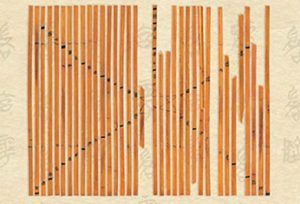Translated From Chinese Bamboo Texts: Ancient Esoteric Knowledge

In what is being described as “a groundbreaking discovery,” scholars from China’s Tsinghua University have successfully translated the mystical texts inscribed on 2,500-year-old bamboo slips.
The collection of 2,500 bamboo slips, in five sets, were collected by researchers from Tsinghua University back in 2008. Now, another team from the same institution has published the results of new research into bamboo slips, in which the rites concerning high official’s meals and the ritual music system from over 2,000 years ago were discovered.
At a press conference on Sunday, the bamboo slips were described as “lost classics” not found in extant literature. According to an ECNS report, Huang Dekuan, director of the Research and Conservation Center for Excavated Texts at Tsinghua University, said the texts were created during the Warring States Period (475–221 BC) and from the Qin Dynasty (221–206 BC).

The Wonders and The Terrors of the Qin Dynasty
Warring States Period: More than 200 Years of Blood-fueled Chinese History
Some of the bamboo texts found in 2008 have been deciphered. (Tsinghua University)
Probing the Minds of Ancient Chinese Thinkers
The official titles of the texts are “Rites of a High Official’s Meal,” “Record of Rites of a High Official’s Meal,” “Diagram of Five Tones,” “Music Style and Fear Heaven” and “Use Body.”
Dekuan said two of the texts were compiled into one volume, made up of 51 and 14 slips, respectively. These documents detail the rites and ceremonial customs surrounding the meals of a high-ranking official, covering the protocols for both hosts and guests, as well as the officiant. Another set of two texts explore an ancient ritualized system of musical notation based on the traditional Chinese musical notes.
The fifth text explores philosophical themes relating to the spiritual relationship between humans and heaven. This deeply-esoteric work contemplates the nature of human subjectivity, and as a whole, the discovery offers researchers a rare insight into the cultural and intellectual musings of ancient China.

Contextualizing The Bamboo Slip Wisdom
The researchers said the translated bamboo slips will assist research into the “rites, music, and thoughts” of the pre-Qin period. At the press conference, Huang Dekuan said the text on the slips is similar to “The Book of Etiquette and Ceremonial” or “Yi Li.”
Dating back to the Western Zhou period, 1046 BC to 771 BC, and attributed to Confucius, this classic serves as a guide to proper conduct and rituals, highlighting the importance of etiquette in developing moral character and social harmony.
The two music books describe China’s early music theory system, as well as filling in gaps in the understanding of pre-Qin music history. These texts fuse music with geometry, for example, in the “Diagram of Five Tones,” the points of a pentagram serve to assemble the five traditional Chinese musical notes: gong, shang, jue, zhi and yu. Furthermore, the text titled “Music Style” is divided into two parts. However, while the first part presents the names of the musical tones, the second part has not yet been accurately translated.
Translating Warring States Wisdom
“Fear Heaven” and “Use Body” is a philosophical document comprising 17 bamboo slips disseminating the connections between humans and heaven, and these particular documents promote human subjectivity fully. The researchers concluded that this provides new documents for the study of pre-Qin’s thought and demonstrates the “pro-active spirit of the people in the Warring States period”.
Anyone who has read Hermann Hesse’s novel, “The Glass Bead Game,” will currently be spinning, for these bamboo slips illustrate the book’s central narrative. The Glass Bead Game is about a mysterious intellectual pursuit set in a future society, where scholars play a complex game combining music, philosophy, and geometry.
Incorporating elements from various ancient cultures and disciplines, through symbolic glass beads, players create a harmonious expression of human understanding, exploring the synthesis of diverse fields of knowledge and the interconnected nature of intellectual disciplines. While the novel does not specifically feature ancient Chinese philosophy and music, it presents a synthesis of philosophy and music, echoing the universal themes of knowledge, wisdom, and the interconnectedness of human experience. Just like the bamboo slips.